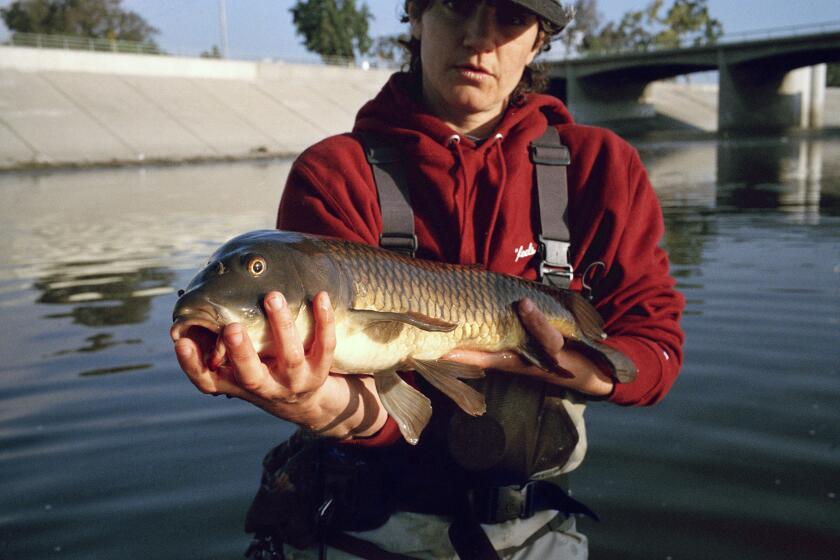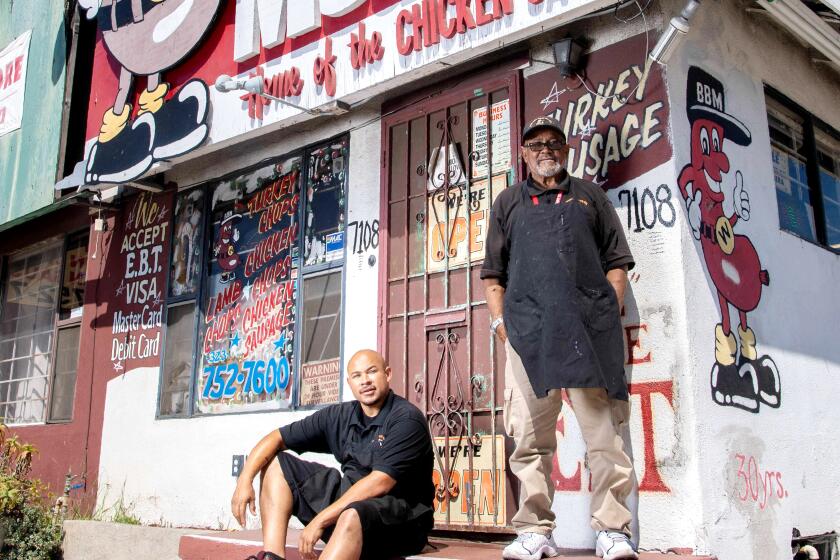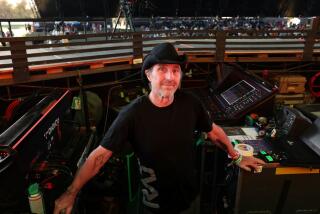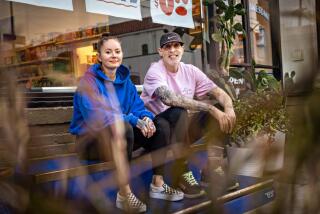We eat econo: Mike Watt on pork sandwiches, punk rock and the future of San Pedro
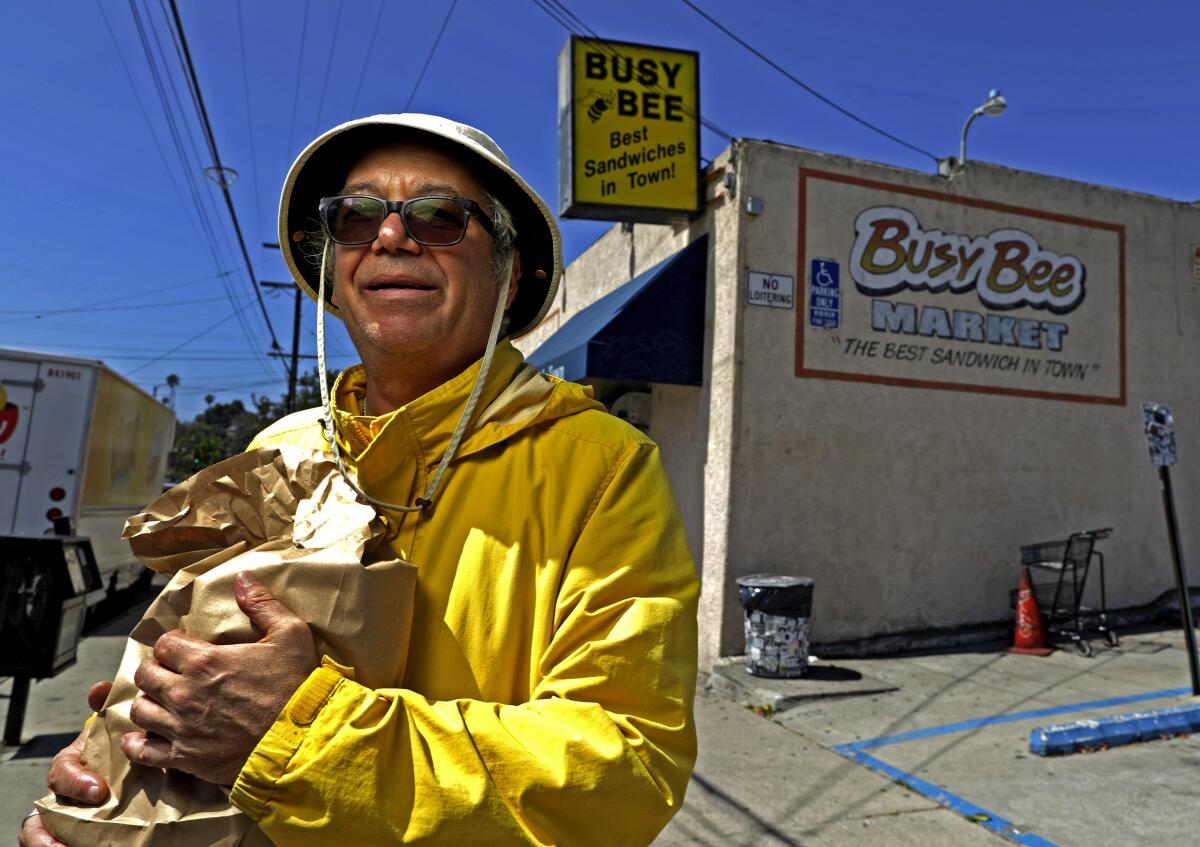
The line is already a dozen people deep at 10 a.m. on a Monday when Busy Bee, a sandwich shop that’s been serving San Pedro for over 40 years, opens its doors. The small crowd is a cross-section of Pedroites: a young mother and son; two contractors waiting in their truck; a guy with a Realtor vibe in a midrange suit; a cop; and Mike Watt, San Pedro’s venerable gift to punk rock.
In 1980, Watt (bass, vocals) and his childhood friends D. Boon (guitar, vocals) and George Hurley (drums) formed the Minutemen, the smartest and most distinctive band to come out of SoCal’s punk scene. The only stylistic link they had to their more aggro peers like Black Flag and the Germs was the brevity of their songs. But with their dual formative inspirations — the angular needling of Brits such as Gang of Four on one side, the flanneled faux proletarians of Creedence Clearwater Revival on the other — the Minutemen made a sound so specific that nobody has even tried to ape it since.
Their band was about punk unity with blue-collar folks — a stance they attributed to their birthplace of San Pedro. In fact, they conceived and espoused a whole way of life around it. They called it “econo,” and Watt still lives it to this day. Work hard, do for yourself, live within your means, don’t put on rock-star airs, push your chosen vocation forward with innovation and bravery — these are the principles of econo, and they can accomplish for you what a million TED Talks never will. But first, you must eat.
“I started coming to the Bee when they opened,” Watt tells me as we wait in line. “I was in high school. Class of ’76, San Pedro High.” And while even cheaper eats could be found locally back then — Watt remembers the long-gone Pup ’N’ Taco, where they sold 19-cent tacos and 19-cent hot dogs — Busy Bee was the champ.
We pay for our sandwiches and walk across the street to Watt’s van. The Ford Econoline is central to the tenets of econo; it’s even the namesake of the whole thing. In Watt-speak, it’s “the boat.” He has his own argot, a stew of maritime slang (his dad was a machinist’s mate in the Navy), ’50s hipster and pure invention. “Chow” is food, to “konk” is to sleep, a “hell-ride” is a rough tour, the “thunder broom” is the bass, a “square john” is a normie. After an hour with him, you find yourself unselfconsciously speaking his language.
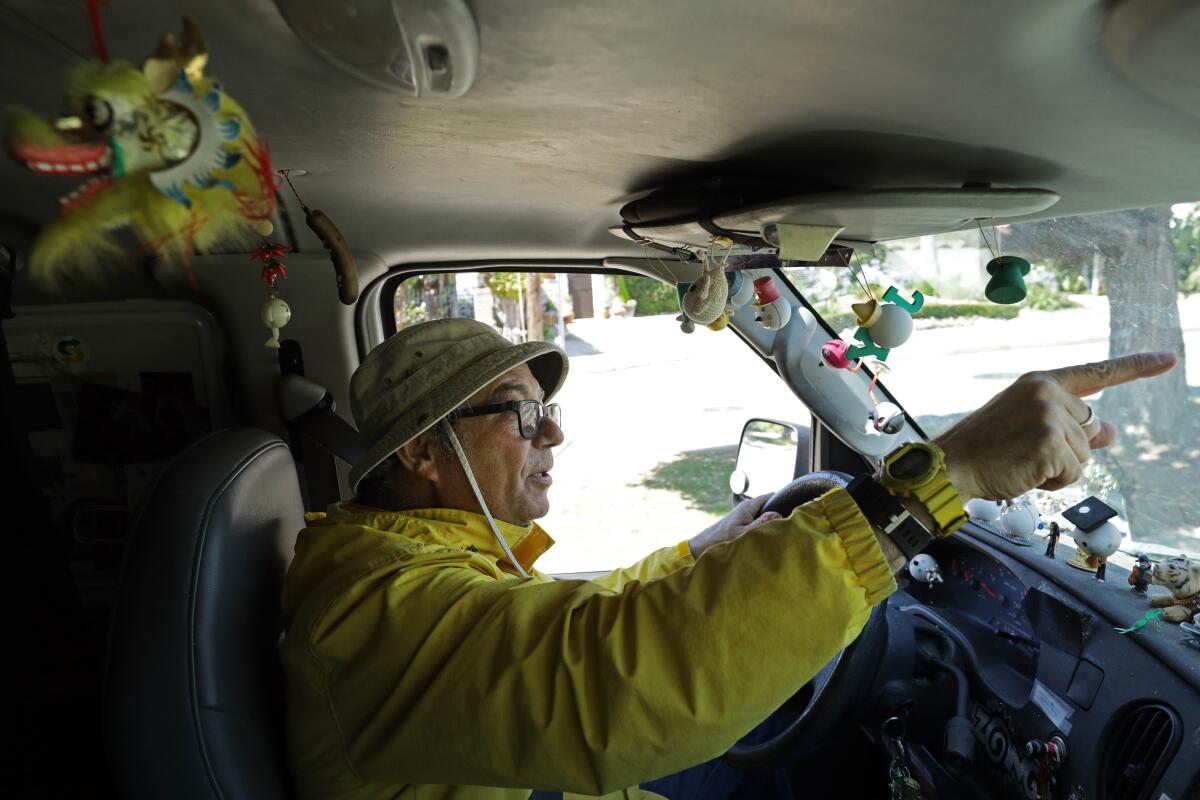
Watt pilots us to a nearby dead end, where an overgrown trailhead opens up to a high cliffside vantage point with a stunning view of the Pacific far below. We sit down in the dirt and unwrap our sandwiches.
“I’m probably the only guy who orders this way at Busy Bee,” Watt says. “I get roast pork, but I only add mustard and onions. It’s like a power trio, where you can hear the bass. In this sandwich, I can taste the pork.”
As a transplant from the Philadelphia/New York megalopolis, I am an insufferable snob regarding meat-centric meals conveyed inside Italian-style rolls. Busy Bee comes very close to my ancestral standards. The roll is more about chewiness and less about crustiness — an essential detail that many places get wrong. The roast pork is buttery, with charred edges on each chunk. Watt’s stripped-down version is deliciously unsubtle, a muscle car of a sandwich.
Belly full, Watt stands up and brushes detritus from his pants as we walk back to the boat. We drive by Royal Palms Beach Park, a busy oceanside idyll. The local Marine Mammal Care Center is releasing a rescued sea lion back into the water; surfers dot the waves. “We used to have ’cues down here,” Watt says. “In Pedro it’s big to cook your own stuff, especially in the summertime. D. Boon made his own barbecue sauce with orange juice. And we had some Polynesian friends who’d roast a whole pig buried in the sand. The best part is the snout. The big kahuna of the party gets to eat that.”
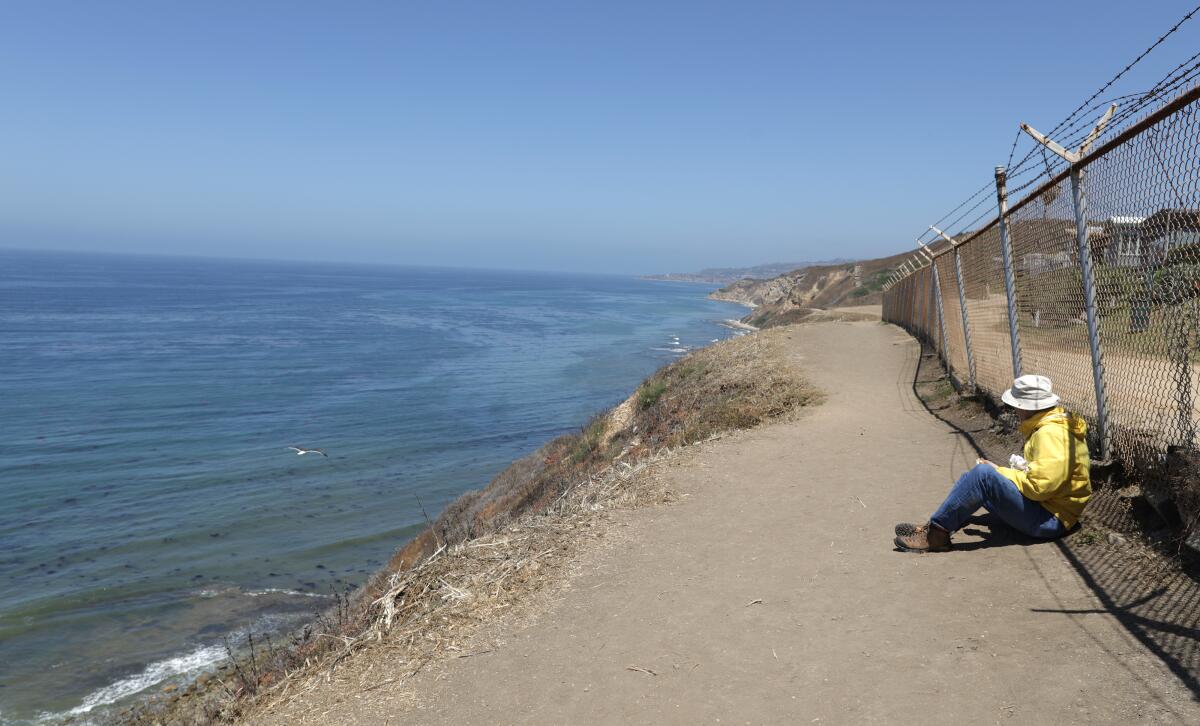
Back inland, we nose into an alley off 19th Street, where Watt stops for a moment, leans over me and points to the second story of an unassuming multi-unit building. “That window on the corner, that’s where the Minutemen started. That was D. Boon’s bedroom.”
D. Boon was killed at age 27 in 1985 in a van accident in Arizona. Watt was devastated by the loss. To this day, D. Boon comes up all the time when talking with Watt, who invokes his departed companion in both tender remembrances and hilarious anecdotes. I like to think of D. Boon as Watt’s guardian angel, an auxiliary conscience who helps him navigate life.
After the accident, Watt considered ditching music altogether. But his friends, including the members of Sonic Youth, nurtured him, and Watt soon formed a new group, fIREHOSE, with Minutemen drummer Hurley and Ed Crawford, a devotee who made a cross-country pilgrimage to Pedro just to persuade the remaining Minutemen to keep toiling.
FIREHOSE lasted until 1994, at which point Watt embarked on a solo and gun-for-hire career that has seen him release a steady stream of albums, including three semiautobiographical rock operas, and cover the bottom end for the Stooges, J. Mascis of Dinosaur Jr., Jane’s Addiction and, most recently, sludgy-punk progenitors Flipper. He even played bass on a Kelly Clarkson record.
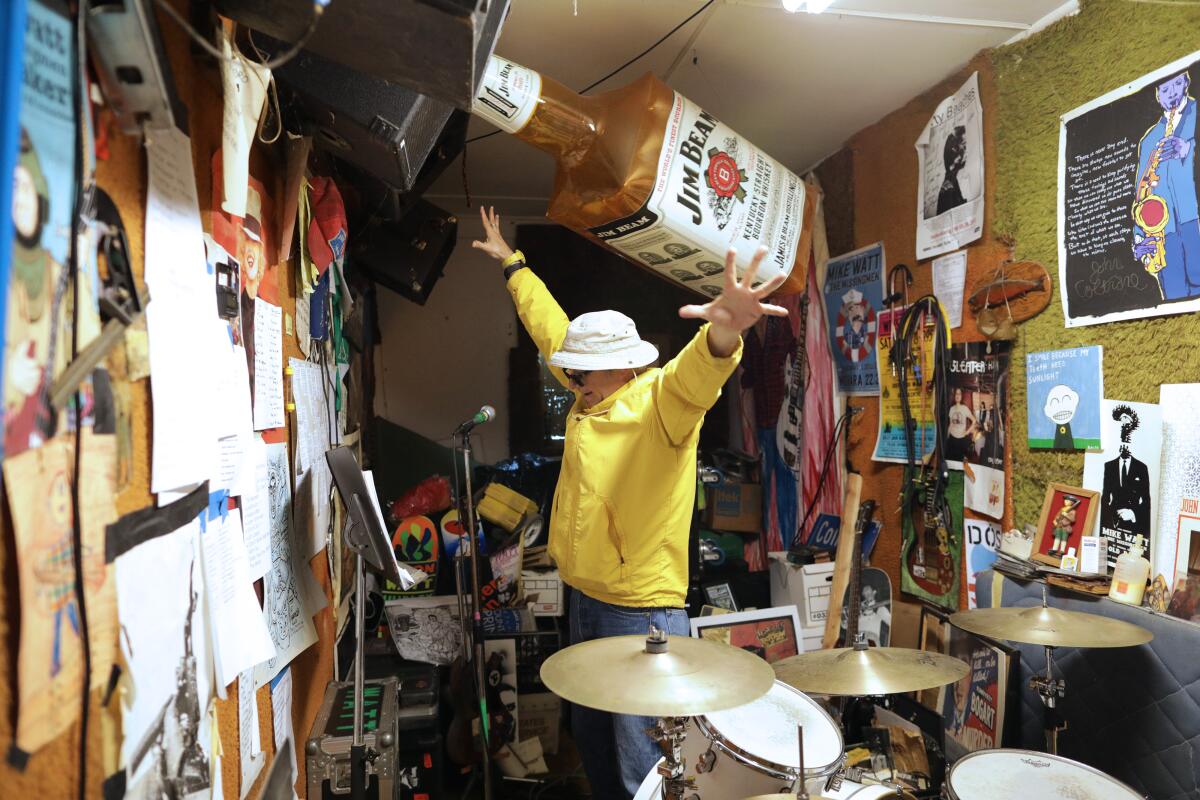
Being a touring musician for more than half his life, Watt learned long ago which foods to avoid, as proven by a story he tells of a harrowing multiday bout of road diarrhea that saw him, in abject surrender, finally taping the bottom of his pants around his ankles to make a massive adult diaper. “All the stuff off the freeways — Crapper Barrel, Taco Butt, Awful House, Hardly’s ... it’s like some dude is driving around with the same bucket of grease fortifying them all,” he says.
But if you’re in a pinch and fast food is your only recourse? “The safest chow on the road is Subway. Mine’s always tuna, olive, mustard and onion. We do the stops like a pit crew. One guy pumps the gas while another guy grabs the sandwiches.”
As for stocking the van with food? “Crackers and ’dines!” he says. “Those tins never go bad, so it’s no prob in the boat on tour. I dig the ones with mustard and we use chili sauce to spike them up. It was a trip when I found out the Stooges dug them too! Much respect to them.”
The dream meal on the road, however, is home-cooked. “It’s the best when I konk at people’s pads and they cook chow,” Watt says. “Sometimes you get done with the gig and they’ve got the barbecue out on the sidewalk!”
Our next stop is a little peninsula that juts out toward Los Angeles Harbor across from Terminal Island. This chunk of man-made land houses a grim mix of attractions: a Coast Guard base, a federal correctional institution (a temporary home to Charles Manson, Timothy Leary and Al Capone) and a memorial to the once-vibrant Japanese fishing village known to its residents as Furusato, which was one of the first communities destroyed by the 1942 executive order that led to the internment of Japanese Americans during WWII. In January, SpaceX pulled out of plans to build Mars-bound rockets on Terminal Island.
The main draw here used to be Ports O’ Call, a Disney-esque simulacrum of a New England fishing village that opened in 1963 and is now almost completely gone. The site is undergoing a renovation into something called the San Pedro Public Market, which is slated to open next year.
At 6 a.m. on a recent Saturday, I donned a borrowed pair of waders with a hole just above the butt, wrestled some waterproof boots over my feet and stepped into the muck of a particularly deep patch of the Los Angeles River.
For now, the fish market continues to operate there. Dotted with vestigial Ports O’ Call decor, it’s got a nostalgic, ’70s-theme-park feel. Fiberglass sharks and squid dot the walls; the space-age seating units are all empty on this Monday afternoon. The market is well stocked with iced rows of tilapia, octopus and shellfish. There’s a counter to order food, and a cacophony of signage touts the World Famous Shrimp Tray.
“I chow here maybe once a month,” Watt says. “I get the squid and chips. You can also buy raw fish and have them cook it. My favorite is halibut. There’s just something about those big barn-door steaks, man, and the tight grain.”
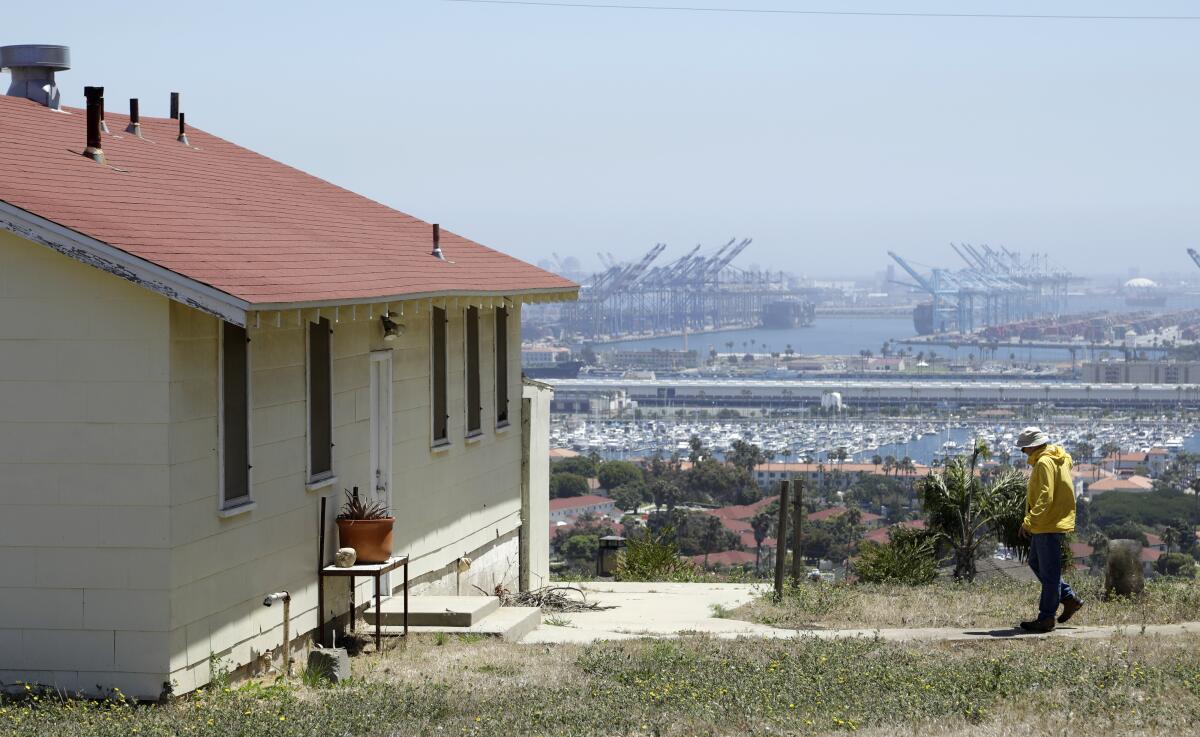
We drive to land’s end, where the channel feeds out to the harbor, and park next to Municipal Warehouse No. 1, a hulking structure built in 1917. Once the focal point of freight coming in and out of the Port of Los Angeles, it’s now a quiet colossus, a bullet point on the National Register of Historic Places. Standing here and looking out over the water, Watt extemporizes about the future of Pedro, a port town where the stevedore is an endangered species. “We’ve got over 350 of those hammerheads here,” he says, pointing across the water to the mammoth gantry cranes that pull containers off cargo ships. “But mechanization is coming. It’s going automated.”
Unless you start up an iconic, game-changing punk group, shipping and fishing were historically how you made a living in Pedro. “Chicken of the Sea and StarKist started here,” Watt says. The commercial canned-tuna business, and the jobs that came with it, was built by elevating the fish in the eyes of consumers. “Tuna used to be like cat food,” Watt says, “then they mixed it with a little mayonnaise and called it tuna salad. Same with squid. It used to be 15 cents a pound. Start calling it calamari, and it’s two dollars a pound. All seafood used to be more econo.”
“Fishermen’s wives used to work in the canneries, but those moved to places like Samoa because here in Pedro, we fished it all out. The only thing that didn’t die off was the squid. There’s still big numbers of them.”
For decades, a small group of black-owned businesses have supplied South L.A. with chicken sausage links, an integral part of black L.A.’s food culture.
So between automated shipyards and the waters becoming depleted of fishable stock, what will work look like in Pedro as progress marches on? An open question, as it is for so many former centers of industry in America. But smaller, hopeful things are appearing. “We’ve got a marine institute called AltaSea,” Watt says, “and they started farming mussels. There’s so much energy and so much chow you can get out of the ocean without raping it.”
Watt drops me off back at Busy Bee and I start my drive out of town. In all its archetypal Californiality — strip malls seemingly frozen in the ’80s, stunning old stone buildings, ugly half-finished condo clusters and almost boringly beautiful ocean vistas — San Pedro feels newly significant to me after today. I sense its spirit, a spirit embodied by Mike Watt, who put it to me very simply as we said goodbye: “Pedro really is bitchin’. That’s why I never left.”
Just outside of town, I turn into Green Hills Memorial Park and, after much wandering, I find D. Boon’s grave. It’s a flat stone with images of a guitar and a painter’s palette carved into it. I sit myself down on the grass and eat the second half of my Busy Bee sandwich.
Busy Bee Market
2413 S. Walker Ave., San Pedro, (310) 832-8660
A couple weeks after my trip with Watt, I returned to Busy Bee to sample more of its menu. The hot Italian sausage sandwich with red sauce and provolone was heartbreakingly accurate — a proudly messy splatter-bomb, a Proustian time machine back to the New Jersey delis of my youth. The torpedo — Busy Bee’s version of a classic lunch-meat hoagie — is so popular that there’s a stack of them ready-made and wrapped to go each morning when it opens. They are a little dry. Request one fresh-made with extra splashes of oil and vinegar to push it into bliss. And remember: The line gets long around lunch.
More to Read
Eat your way across L.A.
Get our weekly Tasting Notes newsletter for reviews, news and more.
You may occasionally receive promotional content from the Los Angeles Times.
